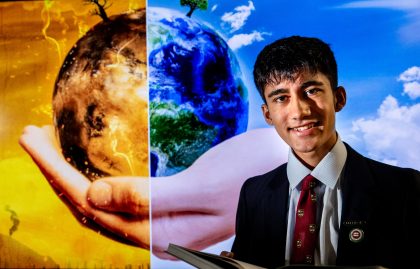“We mustn’t underestimate the power we have in our decision making.”
Meet Rohan Lalli
YEAR 13 STUDENT 2021/22

A Level student Rohan, took part in a COP26 Summer School event run by Leeds University and won its climate change competition with his magazine, Resist.
Tell me about the COP26 Summer School, how did you get involved?
COP26 Summer School is a School of Earth and Environment Event run by Leeds University in the last week of the summer term. BGS gave me a room in the Heads of Year office that I could use to watch the webinars. They had various topics on how to tackle climate change and the issues it will create. Some were to do with how you could explore it via the law, others from business and geographical perspectives.
The week ended in a challenge where you had to imagine leading the COP26 climate change summit in Glasgow and put forward a suggestion to tackle the climate crisis. What did you choose to do and why?
The title was about looking at what you would do to save the climate which is a massive area to go at. There are so many different things you can say. I chose to create a magazine, not something you would find in the hairdressers, but something you could put inside an academic magazine. It was solely on Indonesia and indigenous rights. I’d already devoted a part of my EPQ last year to looking at the rights of indigenous peoples and I was thinking as I watched the webinars that I could incorporate that into my COP entry.
You won the challenge with your colourful magazine. Congratulations!
Thank you! It mainly focused on a socio-geographical insight into Indonesia – the workings of a fossil fuel orientated economy, the socio environmental debate surrounding oil palm and the indigenous struggle. I’m applying to go to Leeds University as well, so I wanted to make a good first impression. It was really good to see the hard work pay off and that my work could be valued in a university setting.
Do you think people are starting to realise that climate change is real, and the danger it poses to our planet?
I think people are getting the physical components, like the ice caps melting and CO2 emissions increasing. But there’s so much ambiguity about the human aspect of climate change and how it’s going to affect people, and how we can protect them. Some of the issues are around capacity. We mustn’t underestimate the power we have in our decision making. Buying sustainable produce, educating ourselves about current climate issues and pressuring TNC’s (transnational corporations) to adopt ethical methods of intervention in emerging nations are just some of the ways people can make a difference.
What do you do personally to support the environment?
I’m quite keen on reducing food waste. I’m active within the Sikh community in Bradford. I like going to the Gurdwara and making sure there’s the correct amount of healthy food so there’s no waste. They’re really good at recycling and healthy eating.
What would you like to do in the future?
I’m currently studying for my A Levels in Biology, Geography and Spanish. I’d like to possibly work for the Government. I like social policy and how geography interacts with decision making.
“Buying sustainable produce, educating ourselves about current climate issues and pressuring TNC’s to adopt ethical methods of intervention in emerging nations are just some of the ways people can make a difference.”